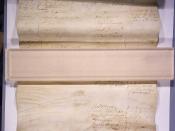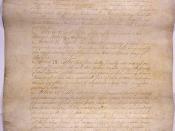The phrase ÃÂfounding fathersÃÂ refers to a group of highly educated colonists who orchestrated independence for the American colonies and formulated the document which would serve as a foundation for governance of the United States. The attitude of the founding fathers toward taxation began as a complete mistrust for taxation assessed by a central government, shifting to a realization that a strong union required the imposition of at least some taxation levied by the central government. The best evidence of the early American attitude toward taxation focuses on the initial reactions to the imposition of taxes by Britain, the more drastic response in declaring independence, developing the Articles of Confederation, the Federalist Papers, and in the language of the United States Constitution itself, the early version of which was careful to limit the federal governmentÃÂs power to tax.
The British government felt justified in imposing taxes on the colonies in America, but the colonists felt the taxes were unfair because they had no say in imposing them.
The taxes were deemed necessary to pay the expenses incurred in the French and Indian War. Britain was forced to incur debt to pay those expenses. Its lawmakers felt that the colonists should bear a substantial portion of the cost, because the colonists received a substantial portion of the benefit of the war (ÃÂAmerican RevolutionÃÂ). To raise the revenue to pay the debts, Britain imposed a series of taxes. The first was embodied in the Sugar Act in 1764. In addition to imposing a tax on molasses, the Act provided for severe penalties in connection with smuggled molasses. The proposition of severe punishment was a blow to the colonistsÃÂ lucrative rum industry (ÃÂBritain TaxesÃÂ).
The unpopular Sugar Act was followed by the Stamp Act, which proved to be even more unpopular. Passed in...


